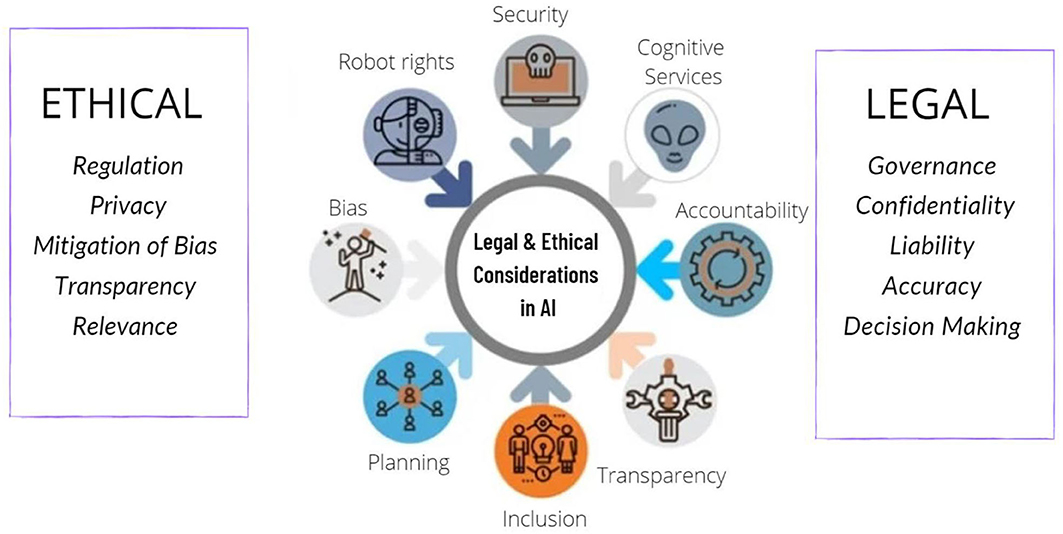5 Ethical Considerations in AI, Artificial Intelligence (AI) is a transformative force that has permeated every facet of modern life, from healthcare to finance, from transportation to entertainment. It’s powering innovations, streamlining processes, and enriching experiences. However, this technological marvel comes with its own set of ethical complexities. In this exploration of ethical considerations in AI research, we delve into the moral terrain that AI developers, policymakers, and society as a whole must traverse.

Table of Contents
Ethical Considerations in AI Research: The Foundation
Before we delve into the specifics, let’s establish the foundation of 5 ethical considerations in AI research. Ethics, in this context, refers to the principles that guide the development and deployment of AI systems. It’s about ensuring that AI serves the greater good, respects human rights, and avoids causing harm.
AI Ethics Principles and Guidelines: Charting the Course
- Transparency and Accountability: One of the fundamental principles of AI ethics is transparency. It involves making AI systems’ operations and decision-making processes understandable and explainable. This transparency not only fosters trust but also ensures that if something goes wrong, accountability can be established.
- Privacy Protection: In an age of data-driven AI, privacy protection is paramount. AI systems often rely on vast amounts of personal data, and it’s essential to safeguard this information from misuse and breaches. Ethical AI practices involve robust data protection measures.
- Fairness and Bias Mitigation: Ensuring fairness in AI decision-making is a pressing concern. Biases, whether explicit or implicit, can seep into AI algorithms and result in unfair outcomes, particularly for marginalized groups. Ethical AI demands proactive measures to identify and mitigate bias.
- Beneficence: The principle of beneficence requires AI developers to act in the best interests of humanity. It’s about using AI for the greater good and avoiding uses that could harm individuals or society.
- Human Control: Ethical AI emphasizes the importance of human control over AI systems. While AI can automate many tasks, there should always be human oversight and intervention, especially in critical domains like healthcare and autonomous vehicles.
Responsible AI Decision-Making: A Delicate Balance
Responsible AI decision-making is about striking a delicate balance between innovation and ethics. It involves making choices that prioritize human well-being and societal benefit over short-term gains. Here are a few areas where responsible AI decision-making is critical:

Healthcare
In healthcare, AI can significantly improve diagnosis, treatment, and drug discovery. However, ethical considerations include patient data privacy, ensuring that AI systems don’t replace human expertise entirely, and addressing potential biases in diagnostic algorithms.
Criminal Justice
AI is increasingly used in predictive policing and sentencing decisions. The ethical challenge here is to ensure that AI doesn’t exacerbate existing biases in the criminal justice system, leading to unfair treatment of certain groups.

Autonomous Vehicles
Self-driving cars hold the promise of reducing accidents and improving transportation efficiency. However, ethical dilemmas emerge when we consider situations where a collision is inevitable. How should AI prioritize the safety of occupants versus pedestrians? These are complex questions that require ethical guidance.
Job Displacement
As AI automates certain jobs, there are ethical considerations surrounding job displacement and the responsibility of companies and governments to provide retraining and support to affected workers.
Addressing AI Bias and Fairness: The Imperative
One of the most pressing ethical considerations in AI is the need to address bias and ensure fairness in AI systems. AI algorithms learn from historical data, and if that data contains biases, AI can perpetuate and amplify those biases. Here’s how we can tackle this issue:

- Diverse Training Data: To reduce bias, AI systems must be trained on diverse datasets that accurately represent the full spectrum of human experiences and demographics.
- Algorithmic Audits: Regular audits of AI algorithms can help identify and rectify bias. This involves scrutinizing the data, algorithms, and outcomes to ensure fairness.
- Ethical Guidelines: Developing and adhering to clear ethical guidelines in AI development can help mitigate bias. These guidelines should emphasize fairness, transparency, and accountability.
- Bias Mitigation Algorithms: AI researchers are actively developing algorithms that can detect and mitigate bias in AI systems. These algorithms can be integrated into the development pipeline to reduce bias.
The Ethical Road Ahead
As AI continues its rapid evolution, ethical considerations become more critical than ever. The path forward involves collaboration among AI developers, policymakers, ethicists, and the broader society. Here’s what the ethical road ahead looks like:
- Regulations: Governments and regulatory bodies are beginning to introduce regulations and standards for ethical AI. These frameworks will play a crucial role in ensuring that AI serves humanity’s best interests.
- Ethics Education: Ethical AI practices should be ingrained in the education and training of AI developers and data scientists. A strong ethical foundation is essential in shaping the future of AI.
- Public Discourse: Ethical AI should be a topic of public discourse. As AI impacts more aspects of daily life, public awareness and engagement are essential in shaping ethical AI practices.
- Continuous Evaluation: Ethical considerations in AI are not static; they evolve with technology. Continuous evaluation and adaptation of ethical guidelines are necessary to stay ahead of emerging ethical challenges.
- **Global Collaboration**: Ethical AI is a global concern. International collaboration and dialogue are essential to ensure that AI serves humanity’s best interests on a global scale.

In conclusion of 5 Ethical Considerations in AI
The journey of AI into our lives is unstoppable, but its trajectory must be guided by a strong ethical compass. Ethical considerations in AI research, encompassing principles, fairness, and responsible decision-making, are not just a matter of choice but an imperative for creating a future where AI truly serves the betterment of humanity.
Thank you for your sharing. I am worried that I lack creative ideas. It is your article that makes me full of hope. Thank you. But, I have a question, can you help me?